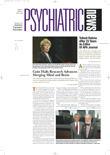Medical student and resident education and training of patient-oriented psychiatric investigators will be the focus of APA's new president, Michelle Riba, M.D., along with efforts to develop the field of psychosomatic medicine.
At the Opening Session of this year's annual meeting in New York last month, Riba cited case histories and personal experiences that illustrated the value of such a focus.
She recalled her own residency when mentors and teachers gave her the opportunity and resources to pursue clinical research about “medical clearance” of patients evaluated in the psychiatry emergency room.
She posed the question: How many patients were not medically cleared, and what happened to them? Did the medical clearance process have value?
“With the help of several faculty, we wrote a protocol to review this issue and wrote a paper that after many, many rewrites was finally published in a peer-reviewed journal,” she said.
Riba said the experience illustrates the value of an academic environment that allows trainees to participate in the clinical encounter with patients and encourages the formulation of clinically valuable research questions.
“If we don't develop a better way to train, mentor, and educate psychiatry students and residents to develop research careers, psychiatric research will no longer be undertaken by physicians but by others lacking patient orientation and dedication,” Riba said.
She recounted an experience from her internship when she was called to the emergency room at 2 a.m. to evaluate a 30-year-old single mother of two children with no insurance; she presented with physical complaints in every organ system.
“She said her scalp itched, her eyeballs burned, her chest ached all the way down to the soles of her feet, [which] were prickly and numb at the same time,” Riba recalled.
The patient was admitted to the psychiatry inpatient service, but after extensive review by attending physicians and medical consultants, the patient's diagnosis turned out to be a severe form of systemic lupus erythematosus.
“She had a severe medical condition, but it presented with symptoms that overlapped with psychiatric symptomatology,” Riba said. “A major group of patients who deserve the attention of psychiatrists are those patients who have both chronic medical as well as psychiatric problems and [whose care] falls under the field of psychosomatic medicine, our newest psychiatric subspecialty.
“The possibilities to enhance our care of patients with chronic medical illnesses are tremendous, have been relatively untapped, and are but one example of the importance of the work that psychiatrists can provide patients while working together with our medical colleagues,” she said.
She recounted also the case of a 14-year-old girl admitted to the inpatient psychiatry unit during Riba's third-year clerkship. The girl had been placed in a cold body of water as part of a religious ritual and was unable to walk or talk. After neurology colleagues found nothing wrong, a diagnosis of conversion disorder was made.
“In the safe environment of the hospital using a variety of therapeutic modalities, we were able to help this girl resume her normal functioning,” Riba said. “But two weeks later, the girl was readmitted with symptoms very similar to those at her first hospitalization.”
What emerged was a history of trauma and sexual abuse that illustrated for Riba how “complicated it really was to help a patient” and the value of excellent medical student and resident education in psychiatry.
“It is essential that we not allow ourselves, because of financial or other pressures, to surrender the opportunity and privilege to teach students and residents,” Riba said. “While it is more labor intensive and certainly not as efficient to have a student or trainee to teach and supervise, it is also the best way to nurture those who will follow and ultimately take over in the demanding work we do.” ▪

